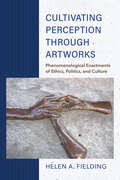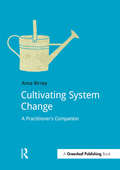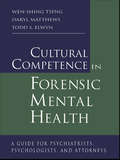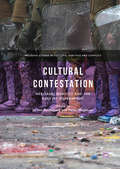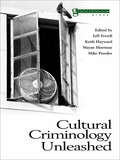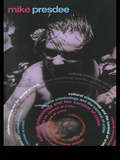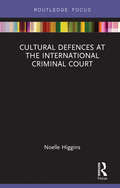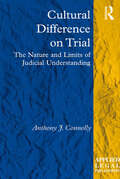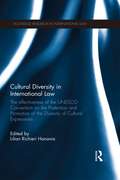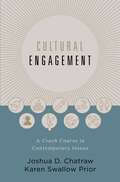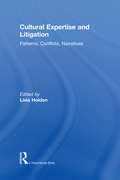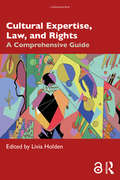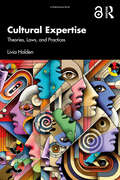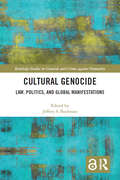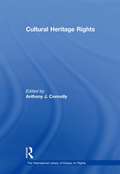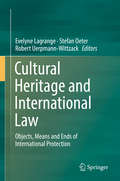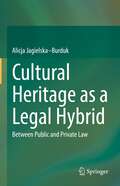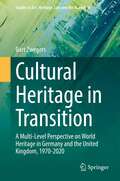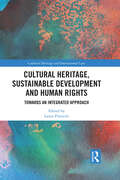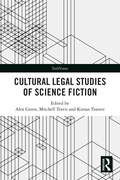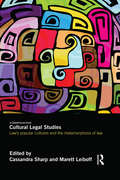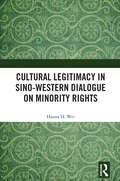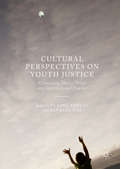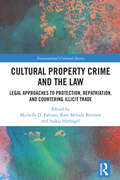- Table View
- List View
Cultivating Perception through Artworks: Phenomenological Enactments of Ethics, Politics, and Culture
by Helen A. FieldingWhat are the ethical, political and cultural consequences of forgetting how to trust our senses? How can artworks help us see, sense, think, and interact in ways that are outside of the systems of convention and order that frame so much of our lives? In Cultivating Perception through Artworks, Helen Fielding challenges us to think alongside and according to artworks, cultivating a perception of what is really there and being expressed by them.Drawing from and expanding on the work of philosophers such as Luce Irigaray and Maurice Merleau-Ponty, Fielding urges us to trust our senses and engage relationally with works of art in the here and now rather than distancing and systematizing them as aesthetic objects. Cultivating Perception through Artworks examines examples as diverse as a Rembrandt painting, M. NourbeSe Philip's poetry, and Louise Bourgeois' public sculpture, to demonstrate how artworks enact ethics, politics, or culture. By engaging with different art forms and discovering the unique way that each opens us to the world in a new and unexpected ways, Fielding reveals the importance of our moral, political, and cultural lives.
Cultivating System Change: A Practitioner’s Companion (Doshorts Ser.)
by Anna BirneyWhere should you start if you are faced with massive systemic challenges or want to cultivate a shift towards sustainability in global systems? Where are the leverage points for systemic change? This book provides examples of what organizations and companies like the Sustainable Shipping Initiative, WWF and Nike are doing, along with practical strategies and an overview of system change theory. Section one outlines systems thinking, especially how we can use a "living systems" perspective as a tool to understanding sustainability and change.Section two pulls out practical strategies for action from theoretical models and "must-read" literature. Section three illustrates how organisations are implementing these strategies – including examples from the Sustainable Shipping Initiative, Nike, Sustainable Food Lab, Finance Innovation Lab, Shell Foundation and Rockefeller Foundation.Section four provides tips for you as a practitioner navigating this territory. Many of the ideas behind cultivating system change can be difficult to understand until they are put into practice. This "practitioner's companion" ends with questions that will prompt reflections and spur you to action. Keep it to hand as you change the system!
Cultural Competence in Forensic Mental Health: A Guide for Psychiatrists, Psychologists, and Attorneys
by Wen-Shing Tseng Daryl Matthews Todd S. ElwynAs culturally relevant psychiatry becomes common practice, the need for competent and culturally relevant forensic psychiatry comes to the forefront. This volume, written by one expert in cultural psychiatry and another in forensic psychiatry addresses that need. By combining their expertise in these areas, they are able to develop and create a new body of knowledge and experiences addressing the issue of the cultural aspects of forensic psychiatry. Beginning with an introduction to cultural and ethnic aspects of forensic psychiatry, this volume will address basic issues of the practice, as well as more detailed areas ranging from the various psychiatric disorders to intensive analysis and discussion of how to perform forensic psychiatric practice in a culturally relevant and competent way. Also the book suggests methods for continued awareness and sensitivity to issues of cultural and ethnic diversity in the field.
Cultural Contestation: Heritage, Identity And The Role Of Government (Palgrave Studies In Cultural Heritage And Conflict)
by Jeroen Rodenberg Pieter WagenaarHeritage practices often lead to social exclusion, as such practices can favor certain values over others. In some cases, exclusion from a society’s symbolic landscape can spark controversy, or rouse emotion so much so that they result in cultural contestation. Examples of this abound, but few studies explicitly analyze the role of government in these instances. In this volume, scholars from a variety of academic backgrounds examine the various and often conflicting roles governments play in these processes—and governments do play a role. They act as authors and authorizers of the symbolic landscape, from which societal groups may feel excluded. Yet, they also often attempt to bring parties together and play a mitigating role.
Cultural Criminology Unleashed
by Jeff Ferrell Wayne Morrison Mike Presdee Keith HaywardFirst published in 2004. Routledge is an imprint of Taylor & Francis, an informa company.
Cultural Criminology and the Carnival of Crime
by Mike PresdeeCultural Criminology and the Carnival of Crime attempts to make sense of the current increase in violence, cruelty, hate and humiliation, which has come to permeate daily life. The text argues that an overly organised economic world has provoked a widespread desire for extreme, oppositional forms of popular and personal pleasure. This desire has resulted in a cathartic 'second life' of illicit pleasures often deemed criminal by those in power. Amongst the exciting issues Mike Presdee addresses are:* joyriding* street crime* antisocial behaviour in private via the internet* hate, hurt and humiliation in popular culture* the popularisation and criminalisation of sadomasochism and dance music cultures.
Cultural Defences at the International Criminal Court
by Noelle HigginsCultural defences, i.e. claims that certain aspects of a defendant’s cultural background should be taken into consideration by courts when adjudicating on their guilt or innocence, have been raised before domestic courts in a variety of jurisdictions. This has been a very sensitive and controversial issue. However, the issue of cultural defences at international tribunals is one that has not yet been fully explored. The main objective of this book is to analyse if the International Criminal Court can, and should, accommodate cultural defences as answers to legal charges, or if the Court should accommodate cultural considerations in other ways.
Cultural Difference on Trial: The Nature and Limits of Judicial Understanding (Applied Legal Philosophy)
by Anthony J. ConnollyCultural Difference on Trial: The Nature and Limits of Judicial Understanding comprises a sustained philosophical exploration of the capacity of the modern liberal democratic legal system to understand the thought and practice of those culturally different minorities who come before it as claimants, defendants or witnesses. Exploring this issue from within the tradition of contemporary analytical and naturalistic philosophy and drawing upon recent developments in the philosophy of mind and language, this volume is informed by a sound academic and practical grasp of the workings of the legal system itself. Systematically analysing the nature and limits of a judge's ability to understand culturally different thought and action over the course of a trial, this volume is essential reading for anyone interested in the workings of the modern legal system.
Cultural Diversity in International Law: The Effectiveness of the UNESCO Convention on the Protection and Promotion of the Diversity of Cultural Expressions (Routledge Research in International Law)
by Lilian Richieri HananiaThe UNESCO Convention on the Protection and Promotion of the Diversity of Cultural Expressions (CDCE) was adopted in 2005 and designed to allow States to protect and promote cultural policies. This book examines the effectiveness of the CDCE and offers ways by which its implementation may be improved to better attain its objectives. The book provides insight in how the normative character of the CDCE may be strengthened through implementation and increasingly recurrent practice based on its provisions. Hailing from various fields of international law, political and social sciences, the book’s contributors work to promote discussions on the practical and legal influence of the CDCE, and to identify opportunities and recommendations for a more effective application. Part One of the book assesses the effectiveness of the CDCE in influencing other areas of international law and the work conducted by other intergovernmental organizations through the recognition of the double nature (cultural and economic) of cultural goods and services. Part Two focuses on the practice of the CDCE beyond the recognition of the specificity of cultural goods and services in international law by addressing the CDCE’s call for greater international cooperation and stronger integration of cultural concerns in development strategies at the national and regional levels. The book will be of great use and interest to academics and practitioners in law, social and political sciences, agents of governmental and international organizations, and cultural sector stakeholders.
Cultural Engagement: A Crash Course in Contemporary Issues
by Joshua Chatraw Karen PriorHow should Christians approach important contemporary issues like war, race, creation care, gender, and politics?Christians in every culture are confronted with social trends and moral questions that can be difficult to navigate. But, the Bible often doesn't speak directly to such issues. Even when it does, it can be confusing to know how best to apply the biblical teaching. <p><p> In Cultural Engagement: A Crash Course in Contemporary Issues authors Joshua D. Chatraw and Karen Swallow Prior first offer a broadly accessible framework for cultural engagement and then explore specific hot topics in current Western culture. <p> Featuring contributions from over forty top thinkers, proponents of various views on the specific topics present their approaches in their own words, providing readers an opportunity to fairly consider options. <p> Unique in how it addresses both big-picture questions about cultural engagement and pressing current issues, Cultural Engagement provides a thorough and broad introduction useful for students, professors, pastors, college ministers, and any believer wanting to more effectively exercise their faith in the public square.
Cultural Expertise and Litigation: Patterns, Conflicts, Narratives
by Livia HoldenCultural Expertise and Litigation addresses the role of social scientists as a source of expert evidence, and is a product of their experiences and observations of cases involving litigants of South Asian origin. What is meant in court by "culture," "custom" and "law"? How are these concepts understood by witnesses, advocates, judges and litigants? How far are cross-cultural understandings facilitated - or obscured - in the process? What strategies are adopted? And which ones turn out to be successful in court? How is cultural understanding – and misunderstanding – produced in these circumstances? And how, moreover, do the decisions in these cases not only reflect, but impact, upon the law and the legal procedure? Cultural Expertise and Litigation addresses these questions, as it elicits the patterns, conflicts and narratives that characterize the legal role of social scientists in a variety of de facto plural settings – including immigration and asylum law, family law, citizenship law and criminal law.
Cultural Expertise, Law, and Rights: A Comprehensive Guide
by Livia HoldenCultural Expertise, Law, and Rights introduces readers to the theory and practice of cultural expertise in the resolution of conflicts and the claim of rights in diverse societies. Combining theory and case-studies of the use of cultural expertise in real situations, and in a great variety of fields, this is the first book to offer a comprehensive examination of the field of cultural expertise: its intellectual orientations, practical applications and ethical implications. This book engages an extensive and interdisciplinary variety of topics – ranging from race, language, sexuality, Indigenous rights and women’s rights to immigration and asylum laws, international commercial arbitration and criminal law. It also offers a truly global perspective covering cultural expertise in Africa, Asia, Australia, Europe, Latin America, the Middle East and North America. Finally, the book offers theoretical and practical guidance for the ethical use of cultural expert knowledge. This is an essential volume for teachers and students in the social sciences – especially law, anthropology, and sociology – and members of the legal professions who engage in cross-cultural dispute resolution, asylum and migration, private international law and other fields of law in which cultural arguments play a role. The Open Access version of this book, available at www.taylorfrancis.com, has been made available under a Creative Commons Attribution-Non Commercial-No Derivatives 4.0 license.
Cultural Expertise: Theories, Laws, and Practices
by Livia HoldenThis book provides a comprehensive examination of the subject of cultural expertise, addressing its theoretical developments, ethical debates, regulatory frameworks, and practices.Elaborating the theory and practice of cultural expertise as it crosscuts legal systems and disciplinary boundaries, the book offers a thorough understanding of the scope, application, and impact of cultural expertise in various socio-legal contexts. The book offers theoretical and practical tools to those with academic or professional interests in cultural expertise, detailing its scope, application, and impact. Throughout, cultural expertise is positioned as a vital interdisciplinary concept, bridging the gap between theoretical frameworks and practical solutions for complex social problems that transcend jurisdictional boundaries, legal fields, and disciplinary categories.This book will appeal to academics and students in the areas of the socio-legal studies, international and comparative law, and cultural anthropology, as well as members of the legal professions and policy-makers who engage with the analysis of laws and cultures.
Cultural Genocide: Law, Politics, and Global Manifestations (Routledge Studies in Genocide and Crimes against Humanity)
by Jeffrey S. BachmanThis book explores concepts of Cultural genocide, its definitions, place in international law, the systems and methods that contribute to its manifestations, and its occurrences. Through a systematic approach and comprehensive analysis, international and interdisciplinary contributors from the fields of genocide studies, legal studies, criminology, sociology, archaeology, human rights, colonial studies, and anthropology examine the legal, structural, and political issues associated with cultural genocide. This includes a series of geographically representative case studies from the USA, Brazil, Australia, West Papua, Iraq, Palestine, Iran, and Canada. This volume is unique in its interdisciplinarity, regional coverage, and the various methods of cultural genocide represented, and will be of interest to scholars of genocide studies, cultural studies and human rights, international law, international relations, indigenous studies, anthropology, and history.
Cultural Heritage Rights (The International Library of Essays on Rights)
by Anthony J. ConnollyThis collection brings together selected articles on key areas in the field of cultural heritage rights discourse. Contributed by an international group of scholars, the papers address conceptual and political issues and explore themes in contemporary literature on cultural heritage such as repatriation, looting and illicit trade, the effects of armed conflict and the relationship between tourism, economic development and cultural heritage. The legal regulation of cultural heritage is also discussed, with articles on regulatory challenges, current practices around the world and issues and challenges in common. Topics which are likely to become increasingly important in the future, such as climate change, cultural globalisation, human genomic science and the shift to a post-liberal, post-rights politics and law of cultural heritage, are also explored. This volume, which presents the most up-to-date scholarship in an area of increasing interest and relevance, is an indispensable reference resource for libraries, lecturers and students.
Cultural Heritage and International Law: Objects, Means and Ends of International Protection
by Stefan Oeter Evelyne Lagrange Robert Uerpmann-WittzackThis book explores the objects, means and ends of international cultural heritage protection. It starts from a broad conception of cultural heritage that encompasses both tangible property, such as museum objects or buildings, and intangible heritage, such as languages and traditions. Cultural heritage thus defined is protected by various legal regimes, including the law of armed conflicts, UNESCO Conventions and international criminal law. With a view to strengthening international protection, the authors analyze existing regimes and elaborate innovative concepts, such as blue helmets of culture and safe havens for endangered cultural heritage. Finally, the ends of international protection come to the fore, and the authors address possible conflicts between protecting cultural diversity and wishes to strengthen cultural identity.
Cultural Heritage as a Legal Hybrid: Between Public and Private Law
by Alicja Jagielska–BurdukThis book examines cultural heritage law in both its public and private modalities, focusing on the search for new solutions in national legislations. Both tangible and intangible cultural heritage pose challenges for national legislation regarding the legal histories of the respective countries, obligations deriving from international law, and the independence of respective national searches for a tailored protection model. Although the concept of cultural heritage transcends civil law regulation and property rights, it must be considered when attempting to establish any coherent cultural heritage protection system. In national legislation, we can now observe an increased interest in leveraging civil law or private law to strengthen cultural heritage protection systems. This book looks beyond public and private law on cultural heritage in order to address its complex status as a legal hybrid. Further, the book shows how current problems in the international debate are mirrored in national legislation. Poland is used as a practical example, while also referring to other countries’ solutions as well as EU and international law instruments. This approach enables the reader to examine the creation of national legislation at the operational level and provides a template for all national lawyers concerning current challenges and emerging trends. The book’s target audience includes researchers and practitioners in the field of cultural heritage law, as well as public and private law experts. The topics covered can also be helpful for law students, art market actors, and all those interested in the challenges of cultural heritage protection.
Cultural Heritage in International Investment Law and Arbitration
by Valentina VadiCan states adopt protectionist cultural policies? What are the limits, if any, to state intervention in cultural matters? A wide variety of cultural policies may interfere with foreign investments, and a tension therefore exists between the cultural policies of the host state and investment treaty provisions. In some cases, foreign investors have claimed that cultural policies have negatively affected their investments, thereby amounting to a breach of the relevant investment treaty. This study maps the relevant investor-state arbitrations concerning cultural elements and shows that arbitrators have increasingly taken cultural concerns into consideration in deciding cases brought before them, eventually contributing to the coalescence of general principles of law demanding the protection of cultural heritage.
Cultural Heritage in Transition: A Multi-Level Perspective on World Heritage in Germany and the United Kingdom, 1970-2020 (Studies in Art, Heritage, Law and the Market #4)
by Bart ZwegersThis book introduces the multilevel perspective to analyze how local, national, and international actors and institutions in the heritage field interact. More specifically, a comparative study is made of controversies regarding six UNESCO World Heritage sites in Germany and the United Kingdom. The six cases involve traditional monuments (the cathedral of Aachen and the castle and cathedral of Durham), industrial heritage (the Zollverein Coal Mine in Essen and the former tin and copper mines in Cornwall), and cities (Dresden and Liverpool). Studying how long-term landscape developments interact with local actors and nationally organized regimes reveals important differences between the decentralized German and the centralized British approach to heritage preservation. These differences not only have consequences for the governance of heritage preservation in the two countries, but also for their relations with international organizations such as UNESCO.
Cultural Heritage, Sustainable Development and Human Rights: Towards an Integrated Approach (Routledge Studies in Cultural Heritage and International Law)
by Laura PineschiThe importance of cultural heritage - in both its tangible and intangible forms - to sustainable development and its economic, social and environmental components is increasingly evident in the recent practice of intergovernmental and non-governmental organizations at the universal and regional level. Due consideration for the integration of the cultural dimension in the implementation of Agenda 2030 has begun to grow in various international fora, including initiatives to emphasize the role and contribution of tangible and intangible heritage as drivers and enablers of sustainable development. It has also been recognized that the inherent links between cultural heritage and sustainable development cannot be correctly addressed without taking into account their various implications for the effective enjoyment of all human rights, including cultural rights. This book offers a thorough academic investigation on the importance of cultural heritage to sustainable development and cultural rights from an international law perspective. Providing an in-depth review of the possible intersections between cultural heritage, sustainable development and cultural rights and the limits of the current legal and institutional framework, it will be of interest to researchers and scholars of international law, cultural heritage law, environmental law and human rights law.
Cultural Legal Studies of Science Fiction (TechNomos)
by Edited by Alex Green, Mitchell Travis and Kieran TranterThis book presents and engages the world-building capacity of legal theory through cultural legal studies of science and speculative fictions.In these studies, the contributors take seriously the legal world building of science and speculative fiction to reveal, animate and critique legal wisdom: juris-prudence. Following a common approach in cultural legal studies, the contributors engage directly, and in detail, with specific cultural ‘texts’, novels, television, films and video games in order to explore a range of possible legal futures. The book is organized in three parts: first, the contextualisation of science and speculative fiction as jurisprudence; second, the temporality of law and legal theory and third, the analysis of specific science and speculative fictions. Throughout, the contributors reveal the way in which law as nomos builds normative universes through the narration of a future.This book will appeal to scholars and students with interests in legal theory, cultural legal studies, law and the humanities and law and literature.
Cultural Legal Studies: Law's Popular Cultures and the Metamorphosis of Law
by Cassandra Sharp Marett LeiboffWhat can law’s popular cultures do for law, as a constitutive and interrogative critical practice? This collection explores such a question through the lens of the ‘cultural legal studies’ movement, which proffers a new encounter with the ‘cultural turn’ in law and legal theory. Moving beyond the ‘law ands’ (literature, humanities, culture, film, visual and aesthetics) on which it is based, this book demonstrates how the techniques and practices of cultural legal studies can be used to metamorphose law and the legalities that underpin its popular imaginary. By drawing on three different modes of cultural legal studies – storytelling, technology and jurisprudence – the collection showcases the intersectional practices of cultural legal studies, and law in its popular cultural mode. The contributors to the collection deploy differentiated modes of cultural legal studies practice, adopting diverse philosophical, disciplinary, methodological and theoretical approaches and subjects of examination. The collection draws on this mix of diversity and homogeneity to thread together its overarching theme: that we must take seriously an interrogation of law as culture and in its cultural form. That is, it does not ask how a text ‘represents’ law; but rather how the representational nature of both law and culture intersect so that the ‘juridical’ become visible in various cultural manifestations. In short, it asks: how law’s popular cultures actively effect the metamorphosis of law.
Cultural Legitimacy in Sino-Western Dialogue on Minority Rights
by Hanna H. WeiBased on a cross-cultural approach to defining and implementing international standards of human and minority rights, this book aims to explore the most plausible way to enhance Sino-Western dialogue on minority rights.Having identified and examined the ideological and practical difficulties that such dialogical events have encountered and will continue to encounter in the future, the book focuses particularly on the role of culture in intercultural communication and on analysing it in conjunction with the complex and intertwined impact of other forces, be they historical, political, social or emotional. The author has successfully found ways to overcome some of the difficulties and to further utilise intercultural dialogue as a conflict management strategy in the field of minority rights.The book will appeal to scholars, postgraduate students, NGOs and policymakers in the fields of human and minority rights with a particular interest in multiculturalism, intercultural dialogue and human and minority rights in China.
Cultural Perspectives on Youth Justice: Connecting Theory, Policy and International Practice
by Elaine Arnull Darrell FoxYoung people, crime and delinquency are words that are commonly linked in public perception and young people are often blamed for social ills. Their deviancy and threat to social control has been held to be a social fact from Plato to today. This book subjects that 'fact' to critical examination through consideration of youth justice systems in six different countries, drawing on sociological and criminological analysis as well as expert practitioner opinion. This book's comparative, cultural approach allows for consideration of the impact of new and emergent systems of communication and discourse and considers how these may impact future constructions of delinquency at a local and global level. Understanding changing constructions of delinquency, the systems and responses we already have and their strengths and weaknesses enables critique about what we do and what we know, and allows us to imagine how it might be otherwise.
Cultural Property Crime and the Law: Legal Approaches to Protection, Repatriation, and Countering Illicit Trade (Transnational Criminal Justice)
by Saskia Hufnagel Michelle D. Fabiani Kate Melody BurmonThis book explores innovative approaches to using and operating within and around both criminal law and civil law in the detection, investigation, and restitution of illicit cultural property.The volume brings together a wide range of authors who research and work in combatting cultural property crime. It explores the normative tensions and intersections between civil and criminal law and where they complement each other in the field. It focuses on innovative legal solutions to the unique challenges presented when facing a transnational form of crime that must consider varying structures of law and order, as well as a deep understanding of the heritage in question, both in past and the present cultures. The collection examines what both areas of law contribute to preventing cultural property crime from occurring, holding offenders responsible before the law, and returning objects to their rightful owners and/or places of origin. Combining the perspectives of academics and practitioners, the volume highlights voices from around the globe, using this range of experience to explore new ideas and applications of legal theory and practice to cases involving cultural property crimes.The book will be of interest to academics and practitioners in cultural property crime in the fields of criminology, law, archaeology, museum studies, political science, economics, and law enforcement.
